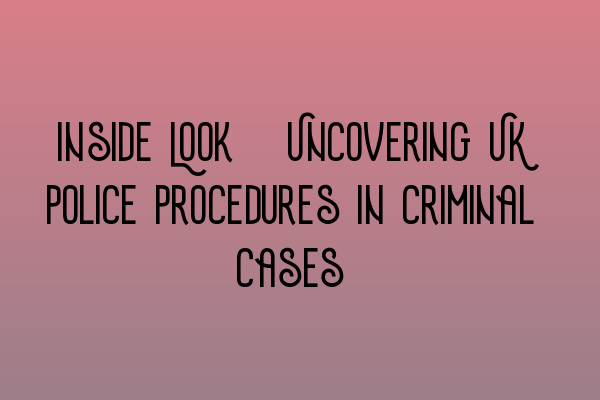Inside Look: Uncovering UK Police Procedures in Criminal Cases
Welcome to SQE Criminal Law & Practice Law UK! In this blog post, we are going to take you on an inside journey into the intricacies of UK police procedures in criminal cases. Whether you’re a legal professional or just an intrigued individual, this article will provide you with valuable insights and knowledge about the workings of the UK justice system.
Understanding police procedures is essential for both defendants and their legal representatives. By comprehending the ins and outs of these proceedings, you can ensure that your rights are protected and that justice is served. So, let’s dive right in and explore the various aspects of UK police procedures.
Investigation Stage:
At the outset of any criminal case, the police undertake a vital role in the investigation process. During this stage, officers collect evidence, interview witnesses, and gather information to support the prosecution’s case. It is vital to understand that the police must act within the boundaries of the law and adhere to strict guidelines to ensure a fair and impartial investigation.
Arrest:
When the police have accumulated enough evidence, they may proceed to make an arrest. This usually occurs when they have reasonable grounds to suspect an individual’s involvement in criminal activity. It is crucial to remember that an arrest does not imply guilt but rather signifies that an individual is being taken into custody for further questioning and potential prosecution.
Custody:
Upon arrest, the suspect is taken to a police station for questioning. Here, certain procedures come into play, such as the suspect’s right to legal representation, access to independent advice, and the entitlement to inform someone of their arrest. The length of time a suspect can be held in custody varies depending on the seriousness of the offense.
Questioning:
During the questioning process, the police will interview the suspect to gather information and potentially obtain a confession. It is essential to note that the suspect has the right to remain silent and the right to have a solicitor present during the interview. These safeguards exist to ensure fairness and protect against self-incrimination.
Charging:
After the investigation and questioning stages, the police will decide whether to charge the suspect with an offense. If there is sufficient evidence, they will formally charge the individual and provide them with details of the allegations against them. At this point, the case will proceed to the court system.
Disclosure:
One critical aspect of UK police procedures is the duty of disclosure. This entails that the police must disclose all relevant evidence and information to the defense. This transparency is crucial to ensure fairness and allows the defense to effectively prepare their case. As a solicitor, it is essential to be vigilant in examining the evidence to identify any discrepancies or gaps in the prosecution’s case.
Court Proceedings:
Once the case reaches the courts, the police have fulfilled their role as investigators. However, their involvement does not end there. Police officers may be required to give evidence in court, and their testimonies can significantly impact the outcome of the case.
Conclusion:
Understanding UK police procedures in criminal cases is vital for defendants and legal professionals alike. By being aware of the various steps involved, one can navigate the justice system more effectively and ensure that their rights are upheld. At SQE Criminal Law & Practice Law UK, we are committed to providing comprehensive legal resources to help you understand the complexities of criminal law.
If you require expert legal assistance or further information about UK police procedures, our team of solicitors is here to help. Contact us today to discuss your case or to seek advice on any criminal law matters.
Remember, having a knowledgeable solicitor by your side can make a substantial difference in the outcome of your case. Let SQE Criminal Law & Practice Law UK be your trusted ally in your pursuit of justice.
